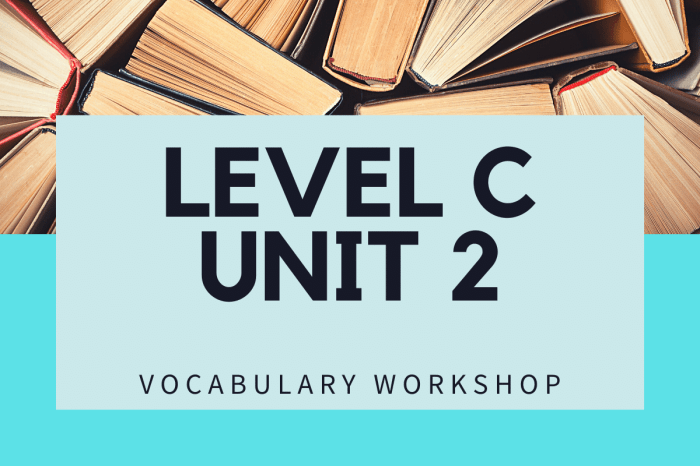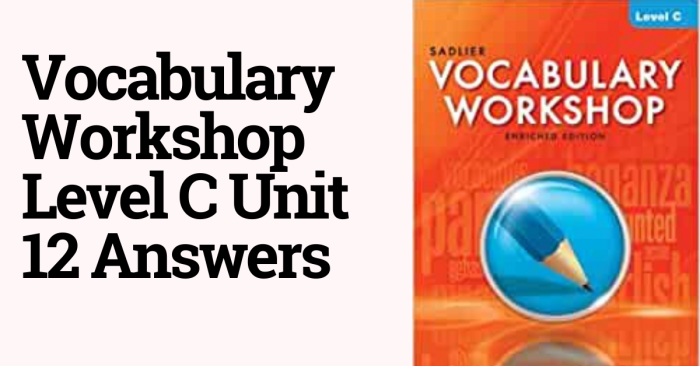Unit 1 vocabulary workshop level c – Welcome to Unit 1 Vocabulary Workshop: Level C, where we embark on a captivating journey to expand your vocabulary and enhance your communication skills. This comprehensive workshop is meticulously designed to provide you with a solid foundation in vocabulary acquisition, word structure, context analysis, figurative language, and practical vocabulary practice.
Throughout this workshop, we will explore the intricacies of vocabulary development, empowering you to decode unfamiliar words, comprehend complex texts, and express yourself with precision and eloquence. Join us as we delve into the fascinating world of words and unlock your potential as a proficient communicator.
Vocabulary Acquisition

Effective vocabulary acquisition involves employing various strategies that promote long-term retention and comprehension. These strategies include:
- Immersion:Reading widely, listening to audiobooks, and engaging in conversations expose learners to new words in authentic contexts.
- Spaced Repetition:Regularly reviewing vocabulary at increasing intervals helps strengthen memory and recall.
- Active Learning:Using flashcards, creating mind maps, or engaging in vocabulary games makes learning interactive and enjoyable.
- Contextualization:Understanding words within the context of sentences or paragraphs provides meaningful connections and enhances comprehension.
Word Structure
The morphological structure of words refers to the way they are formed by combining prefixes, suffixes, and root words. Understanding word structure aids in decoding unfamiliar words and expanding vocabulary:
- Prefixes:Affixes added to the beginning of a word that change its meaning (e.g., “un-” in “unhappy”).
- Suffixes:Affixes added to the end of a word that change its part of speech (e.g., “-ment” in “argument”).
- Root Words:The core meaning unit of a word, often derived from Latin or Greek (e.g., “scrib” in “scribe”).
Vocabulary in Context, Unit 1 vocabulary workshop level c
Context clues play a crucial role in determining the meaning of unfamiliar words within a text. Types of context clues include:
- Definition:A direct definition of the word is provided within the text.
- Example:An example of the word’s usage is given.
- Contrast:The meaning of the word is contrasted with another word or idea.
Utilizing context clues helps learners infer meaning and expand their vocabulary.
Figurative Language
Figurative language employs non-literal expressions to enhance writing and communication. Common types of figurative language include:
- Metaphors:Implied comparisons between two unlike things (e.g., “Life is a journey”).
- Similes:Direct comparisons using “like” or “as” (e.g., “Her smile was as bright as the sun”).
- Personification:Giving human qualities to non-human entities (e.g., “The wind whispered secrets”).
Figurative language adds depth and creativity to writing, making it more engaging and memorable.
Vocabulary Practice
Regular practice is essential for vocabulary retention. Engaging activities include:
- Vocabulary Games:Crosswords, word searches, or Scrabble help reinforce vocabulary in a fun way.
- Quizzes:Online or in-class quizzes assess understanding and promote recall.
- Word Lists:Creating and reviewing lists of vocabulary words and their definitions provides a structured approach to learning.
Questions and Answers: Unit 1 Vocabulary Workshop Level C
What is the purpose of Unit 1 Vocabulary Workshop: Level C?
Unit 1 Vocabulary Workshop: Level C is designed to provide a comprehensive foundation in vocabulary acquisition, word structure, context analysis, figurative language, and practical vocabulary practice.
What are the key strategies for effective vocabulary acquisition?
Effective vocabulary acquisition involves using strategies such as reading widely, using flashcards, practicing active recall, and engaging in meaningful conversations.
How can I improve my understanding of word structure?
To improve your understanding of word structure, focus on identifying prefixes, suffixes, and root words, and analyze how they contribute to the meaning of words.

